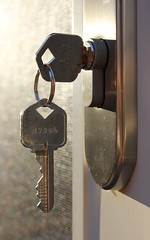So, how are you feeling about your privacy lately? The news is full security breaches and examples of how people's lives have been affected by social media. Most of these stories have not been of the `good news' variety. If you read my last post, you'll know information is continually being collected and indexed about you and your network. I'm not endorsing giving up on social media I'm out there every day enjoying the experience but I do have some suggestions on how you can preserve your privacy.
Every week we're being treated to a new story about how our privacy is being eroded. Even recreational users of social media have to take notice of stories like these:
-
[*]Anger After TwitPic Claims Rights to Uploaded Pictures
- Nielsen: U.S. Smartphone Users Concerned About Privacy and Location Data
- Your iPhone is Tracking Your Every Move
Facebook Applications Leak Users' Personal Data to Third Parties
Big Brother is Your Friend on Facebook
What can you do to protect your privacy?
Danah Boyd, Senior Researcher at Microsoft Research, a Visiting Researcher at Harvard University's Law School, and an Adjunct Associate Professor at the University of New South Wales, said this in a paper she gave at the 32nd International Conference of Data Protection and Privacy Commissioners:
"Privacy isn't about controlling functional access to content as much as knowing what to share when and how it will flow."
In a sea of self-proclaimed social media experts, Danah Boyd is the real deal. In light of her advice, these are my recommendations on how to enjoy your social media experience without compromising your privacy.
Behave as if the world is paying attention because it is
It's easy to forget who is in your network and who is paying attention especially if your connections have been built over a long period of time. Additionally, it's impossible to tell who is seeking you out your family, your neighbours, your friends, your work colleagues, your competition, and your enemies. Remember, we've been conditioned to build big networks.
Turn off GEO tracking on your electronic devices
Obviously, carrying a remote GPS device is going to be a dead give-away about where you are and what you're doing. You may not even realise your laptop or your phone is sending signals. Don't forget your car could also carry tracking devices, too.
Remove or deactivate social networking accounts you no longer use
If you're not actively using an account, there's no point in having delinquent profiles hanging around. They still contain a lot of information about you and help flesh out a better picture of who you are. Handy tools like KnowEm.com can help you find old accounts especially if you use a common user ID.
Refrain from using auto posting features
You may not realise you're giving out information if you're letting a social media tool automatically update or post. FourSquare is one area where people forget how much they're broadcasting.
Refrain from using cross channel integration
While it might seem like a good idea when you first set up a new profile, cross channel integration goes a long way to eroding your privacy. Often we behave differently in different channels. I recently discovered I had linked my Twitter account to my company profile on LinkedIn. I was horrified when I discovered a bunch of banal tweets displayed on the Global Copywriting page.
Become familiar with privacy settings
Privacy settings can be a red herring because they change so often. Still, it makes sense to have a look at each of your social networking sites and make sure the settings are what you want. Often, privacy policies change and so do your settings without notification.
My Personal Rules
In addition to the rules above, I try to adhere to some personal guidelines.
Don't post personal photos of anyone
I'm very uncomfortable by how quickly photos travel and how they can be used by anyone at any time. I don't post photos of people, except if it's attached to something I'm doing in my work. You will never see me post photos of children. While I know it's a great way to share with family and friends, it's nearly as easy to send out an email.
Never mention the names of my family
My family is not active in social media. While I might discuss something that happened at home, I never refer to them by name. It's not up to me to `out' them.
Do not discuss my whereabouts or advertise when I'm away from home
I really don't want the masses to know where I am or where I'm going to be. Again, if I'm doing something related to my professional life, then I'll post it. Otherwise, you won't hear about what coffee shop I'm sitting in or when I'm going on holiday. If it's a notable experience and suitable for mass consumption, I'll give a review after I'm back.
Don't reveal my birthdate
Your birthdate is the holy grail for anyone trying to find out more about you. When forced to give one as part of the sign-up procedure, I use a false date. There's absolutely no reason, legally, why any social networking channel needs to know your real birth date.
The Take-Away
Social networking has changed how we communicate with each other, how we work, and how we socialise. The information we post on social media lives in perpetuity and we do not own it once it's posted. Importantly, how the tools are integrated and the way the information flows between the channels impacts our privacy. Adhering to a few relatively simple guidelines will help ensure you only have good experiences in your online networking.
What do you do to protect your social media privacy?
Social Media and Privacy Presentation in Perth
I'll be giving a presentation about Social Media and Privacy in Perth on 27 May 2011 at the next Women in Technology, WA (WITWA) breakfast event. You don't have to be a member to attend. (Sorry guys, this one is a 'woman only' event.) For more information, visit the event calendar at WITWA.
Subscribe
Subscribe here to have new posts from the Global Copywriting Blog delivered by email
Image Credit: door key by woodleywonderworks, on Flickr



Recent Comments